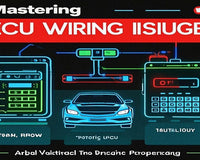
ECU tuning, also known as remapping, involves modifying the software within a car's Engine Control Unit (ECU) to enhance its performance. This process can lead to several significant improvements in how a vehicle operates.
Increased Horsepower and Torque: One of the primary benefits of ECU tuning is the increase in horsepower and torque. Many vehicles can see gains of 10-20% in horsepower from a standard ECU tune, with some high-performance models achieving increases of up to 50%1. This enhancement allows for more powerful acceleration and overall better performance on the road.
Improved Throttle Response: Tuning optimizes the throttle response, making the vehicle feel more responsive when accelerating. This improvement is particularly noticeable in turbocharged engines, where quick throttle response can significantly enhance driving dynamics.
Fuel Efficiency: Interestingly, ECU tuning can also lead to better fuel efficiency. By optimizing the air-fuel mixture and other parameters, MPM OTG tuners can help engines run more efficiently, potentially reducing fuel consumption while still increasing power output.

Customization Options: Tuning allows for customization based on individual driving preferences. Drivers can choose specific tunes that cater to their desired performance characteristics, whether they prioritize power, efficiency, or a balance of both.
Enhanced Engine Management: The ECU controls various aspects of engine operation, including fuel injection timing, ignition timing, and boost pressure in turbocharged engines. By reprogramming these settings, Hantek 1008A tuners can ensure that the engine operates at its optimal level under different conditions.

While ECU chip tuning can help you get more out of your car’s engine, there are also risks associated with this procedure.
A poorly executed tune can lead to incorrect air-fuel ratios, ignition timing issues, and excessive boost pressure, which may increase engine wear or even cause catastrophic failure. For instance, using a generic tuning box without proper customization can result in higher operating temperatures and premature wear of components like spark plugs and ignition coils.
Improper tuning can increase the stress on engine components. If the modifications push the engine beyond its designed limits, it may lead to increased wear and tear. This is particularly true if the tune does not account for the vehicle's specific hardware and operating conditions.
It's important to note that ECU tuning can void manufacturer warranties if detected during service visits. This is because manufacturers often consider any modifications that affect engine performance as grounds for warranty denial.

Overall, ECU tuning is a powerful way to enhance vehicle performance by unlocking hidden capabilities within the engine's management system. However, it is crucial that this process is performed by qualified professionals to avoid potential issues with engine reliability and warranty concerns.










